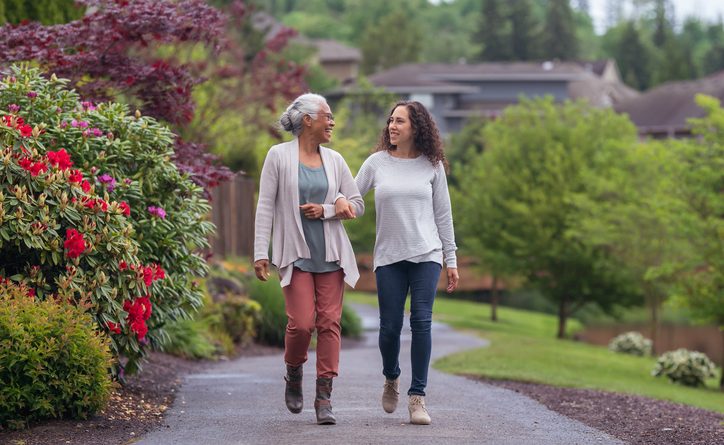How to prevent falls
Taking care to improve your surroundings can stop accidents before they occur
By Betsy Butler, Ohio Public Employees Retirement System
Sept. 14, 2023 – A dark night, an unlit sidewalk and a rogue broom handle are a risky combination, my mother recently discovered, as she tripped, fell and ended up with a broken wrist. That split-second mishap now has months of consequences, landing her in a splint and me as her caregiver as she heals.
Falls like my mother experienced can happen to anyone, but they are a leading cause of injury among older adults. Physical changes, health conditions, and sometimes the medications taken to treat them can contribute to making falls riskier as we age. Learning how to prevent a fall becomes paramount.
Simple strategies can help prevent falls, reduce the need of follow-up medical care, and maintain our independence as we age. Here are a few tips:
Review your medications and health conditions with your health care provider. A medical professional can assess for any side effects or interactions that may make you tired, cause dizziness, affect your thinking and therefore increase your risk of falling. Certain eye and ear conditions, joint pain or stiffness, numbness in feet and legs, muscle strength, balance, walking style and potential cognitive impairment can also be evaluated.
Give your feet a break. Trade high heels, flip-flops and shoes with slick soles for sensible, sturdy, non-skidding footwear that fits properly and doesn’t make you slip, stumble and fall. When walking on snow and ice, slow your pace, shorten your steps and walk with a wider base of support.
Remove potential fall hazards from your home. Toss clutter that’s found its way to the floor, tie up electrical cords, and move furniture out of your path. Secure or remove throw rugs, and repair loose floorboards, steps or carpeting. Use nonslip mats or a bath seat in the tub or shower. Always keep objects off the stairs. Keep things that you use often on lower shelves.
Turn on the lights. Keep your living spaces brightly lit. Install night lights in bathrooms and hallways. Have working lights and light switches at the top and bottom of the stairs, and turn on the lights before ascending or descending staircases. Keep flashlights handy so they’re easy to find in power outages.
Keep steady with assistive devices. Install handrails on both sides of stairways, nonslip treads on wood steps, and grab bars in the bathroom. Use a cane or walker for extra steadiness. Never use a chair as a step stool.
Get your rest and eat well. Nutritious foods, especially those high in vitamin D, calcium and potassium, can help build muscle strength and reduce the risk of falls. Protein helps to maintain muscle mass. Also, discover strategies to sleep better.
Make time for exercise. Physical activity improves strength, balance, coordination and flexibility. Take a Tai-Chi class to learn graceful moves that can help you fall more smoothly. Repeat simple exercises each day, such as practicing heel-toe raises using a counter for support. Move from sitting in an armchair to standing by keeping your feet flat on the ground, your hands on the armrests of the chair, moving your bottom and torso forward in the chair, then pressing into your feet and hands to stand up, using the armrests for support.
If you find yourself in a free-fall, try to remember these tips:
- Relax and don’t panic. Don’t try to stop the fall. Instead, try to spread the impact of the fall over as much of your body as possible, using more cushioned areas like your derriere and thighs to soften the blow.
- Bend your elbows and knees.
- Tuck your chin to your chest if you’re falling backward. If you’re falling forward, turn your face to the side.
- Keep your arms by your sides, out of harm’s way. Don’t try to stick your hands out to catch yourself, as that will likely result in a broken wrist or forearm, or dislocating an elbow or shoulder.
- Allow yourself to go limp and collapse.
- As soon as you hit the ground, keep the movement going and roll onto the side of your torso and upper back. Try to curl your body as you roll.
- After the fall, take a few minutes before you get up. Then see whether you have any cuts, bumps and possible breaks.
Betsy Butler
Betsy Butler is the Ohio Public Employees Retirement System’s knowledge and issues strategist, researching information on pensions, retirement and health care. Betsy came to OPERS in 2009 after working as a special collections librarian for two OPERS employers: the Ohio History Connection and Miami University.
